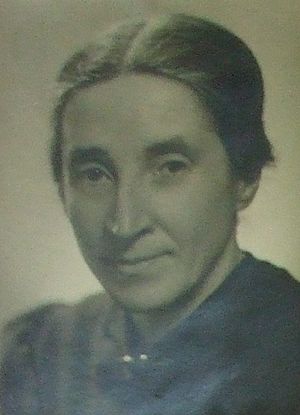Elizaveta Karamihailova facts for kids
Quick facts for kids
Elisabeth Ivanova Kara-Michailova
|
|
|---|---|
 |
|
| Born | 3 September 1897 |
| Died | 24 April 1968 (aged 70) |
| Nationality | |
| Alma mater | University of Vienna |
| Known for | Cosmic ray, radioluminescence and ionization studies |
| Scientific career | |
| Fields | nuclear physics |
Elisabeth Ivanova Kara-Michailova (Bulgarian: Елисавета Иванова Карамихайлова), also known as Elisabeth Karamichailova, was a brilliant physicist from Bulgaria. Her father was Bulgarian, and her mother was English.
She was one of the first women to become a nuclear physicist in the early 1900s. She also started the first hands-on courses for particle physics in Bulgaria. She was even the first woman to become a professor in her country!
Early Life and Education
Elisabeth Karamichailova was born in Vienna, Austria, in 1897. Her parents were Ivan Mikhaylov and Mary Slade. Both her parents had studied at the University of Vienna. Her father, Ivan, was from Shumen, Bulgaria, and studied medicine. Her mother, Mary, was from England and studied music.
After her father finished his studies in 1907, the family stayed in Vienna for two more years. In 1909, they moved to Bulgaria and bought a large house in central Sofia. Elisabeth grew up in a home that valued both art and science. Her father even turned the top floor of their house into a Red Cross Hospital. He treated patients there without asking for payment.
Elisabeth went to the Sofia Girls' College and graduated in 1917. After that, she went to study at the University of Vienna, just like her parents.
Discoveries in Radioactivity
In 1922, Elisabeth Karamichailova earned her PhD in Physics and Mathematics. Her main project was about electric patterns on different materials, especially crystals. She continued her research at the Institute for Radium Studies. She became very interested in radioluminescence, which is light given off by radioactive materials.
She worked with another scientist, Marietta Blau, to study polonium. Later, Elisabeth researched ways to bombard thorium with neutrons. At the same time, she took classes in electronic and radio engineering. In 1923, she briefly returned to Bulgaria. She worked as a guest researcher at the Physics Institute of Sofia University.
Soon, Elisabeth went back to Vienna. There, she began studying how light elements change when hit by alpha radiation. In 1931, Karamichailova and Marietta Blau made an important observation. They saw a new type of radiation coming from polonium. This radiation was later confirmed by James Chadwick as neutron radiation. This discovery led to Chadwick finding neutrons, which are tiny particles inside atoms.
In 1933, Elisabeth's research assistant job in Vienna ended. She had to continue her work without pay until 1935. Then, she received a special scholarship from Girton College, Cambridge. This allowed her to work at the famous Cavendish Laboratory in England.
In 1937, she applied for a teaching position in Experimental Physics at Sofia University. She managed to extend her scholarship for a few more months. Finally, in 1939, she returned to Bulgaria. She became a teacher of Experimental Atomistics with Radioactivity at Sofia University. She created a new course on atomic physics. She shared the latest knowledge and equipment from her studies in Austria and England. However, the start of World War II stopped any further growth in nuclear research.
Her studies also began to include cosmic rays. These are high-energy particles from space. Karamichailova used special photographic plates to continue her work in this area. She had worked on this with Marietta Blau before. She tried to keep studying ionization, which is when atoms gain or lose electrons. But this was hard without the advanced equipment she had in England. When she started working in Sofia in 1940, she only had a microscope and a dark room.
Later Life and Legacy
After a political change in Bulgaria in 1944, the new government considered Karamichailova "unreliable." This meant she was not allowed to travel abroad. Despite this, she continued her work on radioactivity in Bulgaria. She worked first at Sofia University and later at the Bulgarian Academy of Sciences. There, she earned the title of "professor."
Elisabeth Karamichailova passed away from cancer in 1968. It is believed that her illness was likely caused by long-term exposure to radiation from her scientific work.
See also
 In Spanish: Elisaveta Karamijailova para niños
In Spanish: Elisaveta Karamijailova para niños

